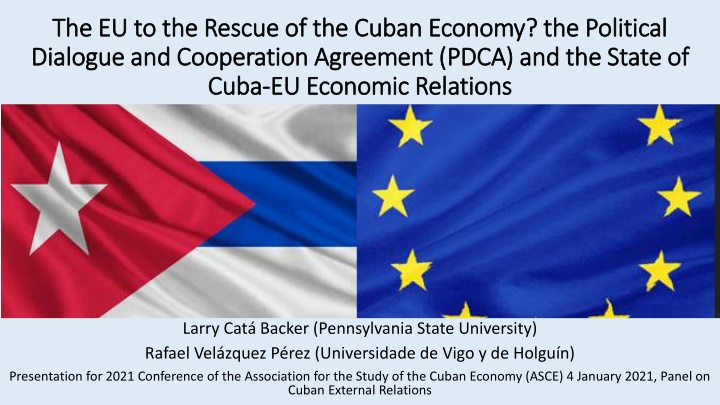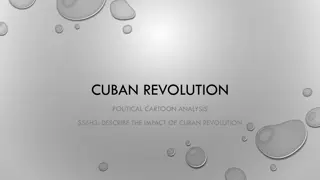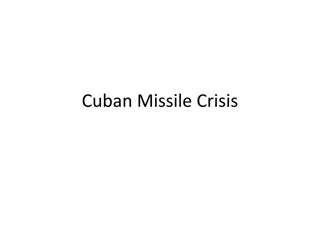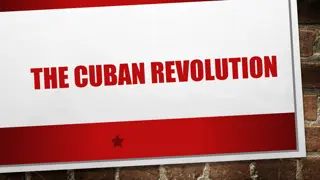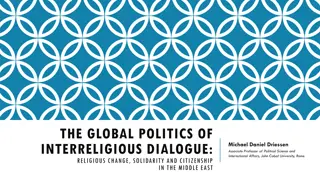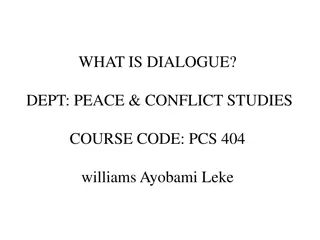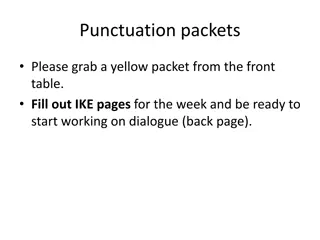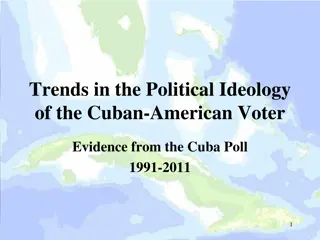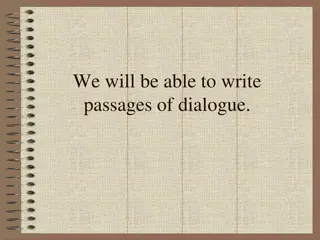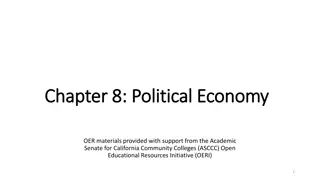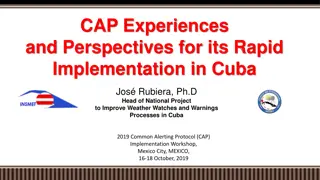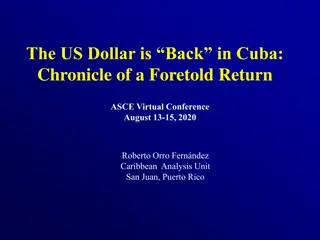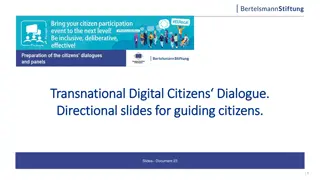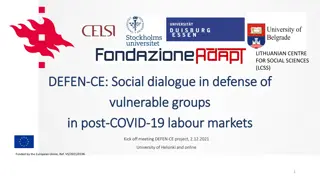The EU's Role in Cuban Economy: A Political Dialogue Overview
Explore the impact of the Political Dialogue and Cooperation Agreement (PDCA) between Cuba and the EU on the Cuban economy. Delve into the dynamics of EU-Cuba economic relations and the significance of this partnership. Gain insights from experts' perspectives shared at the ASCE 2021 Conference.
Download Presentation

Please find below an Image/Link to download the presentation.
The content on the website is provided AS IS for your information and personal use only. It may not be sold, licensed, or shared on other websites without obtaining consent from the author.If you encounter any issues during the download, it is possible that the publisher has removed the file from their server.
You are allowed to download the files provided on this website for personal or commercial use, subject to the condition that they are used lawfully. All files are the property of their respective owners.
The content on the website is provided AS IS for your information and personal use only. It may not be sold, licensed, or shared on other websites without obtaining consent from the author.
E N D
Presentation Transcript
The EU to the Rescue of the Cuban Economy? the Political The EU to the Rescue of the Cuban Economy? the Political Dialogue and Cooperation Agreement (PDCA) and the State of Dialogue and Cooperation Agreement (PDCA) and the State of Cuba Cuba- -EU Economic Relations EU Economic Relations Larry Cat Backer (Pennsylvania State University) Rafael Vel zquez P rez (Universidade de Vigo y de Holgu n) Presentation for 2021 Conference of the Association for the Study of the Cuban Economy (ASCE) 4 January 2021, Panel on Cuban External Relations
Since the 1959 Revolution Cuba has created a pattern of economic and political relations that has changed very little First it is driven by opposition to and from the United States A distorted relation based on mutual antipathy and substantial integration in trade, migration and the like Second it is based on a strong (though sometimes contentious) relation with a principal patron The Soviet Union (strong patron) Venezuela (patron-colleague-partner) Third it includes a secondary group of important partners An Anti-US Bloc: Iran; North Korea, China, Russia A Regional integration bloc: CARICOM; ALBA; sympathetic states Fourth it includes those states that serve a mediating role Vietnam The European Union (and principally Spain, then Italy, France, Germany and the Netherlands) Cuba s External Relations Template
Cuba and Europe
Presentation Objectives
The EU signed the Political Dialogue and Cooperation Agreement (PDCA) with the Cuban government in December 2016. EU Parliament approved this agreement in July 2017 (567 votes to 65, with 31 abstentions). Many EU Members States ratified thereafter. Two perspectives: For the EU, the PDCA is a tool for 'accompanying' and 'supporting' a process of change and modernisation in Cuba, supporting economic and social development and European values, including the promotion of democracy and respect for human rights. For Cuba, the agreement represents the normalisation of its relationship with an important economic and trade partner and contributes to the diversification of its external relations. (Association of Accredited Public Policy Advocates to the European Union) PDCA
A Profound Transition From 1996 to 2016 From this (1996) The objective of the European Union in its relations with Cuba is to encourage a process of transition to pluralist democracy and respect for human rights and fundamental freedoms , as well as a sustainable recovery and improvement in the living standards of the Cuban people (EU Common Position 1996 1). To this (2017) The central basis for relations is equality, reciprocity and mutual respect, the respect for and the promotion of democratic principles and respect for all human rights and fundamental freedoms, and the recognition that all peoples have the right to determine freely their political system and to pursue freely their economic, social and cultural development.
PDCACore Framework (Article 1) reaffirm general commitments to a set of ambiguous concepts: multilateralism, respect for international law and the principles of the U.N. Charter, the principles of equality, reciprocity and mutual respect, and to the promotion of sustainable development. (Art. 1 1-2, 4). BUT implementation of PDCA would be undertaken "in accordance with their respective constitutional principles, legal frameworks, legislation, norms and regulations, as well as the applicable international instruments to which they are parties." (Art. 1 3). A delicate balancing act declarations of "respect for and the promotion of democratic principles, respect for all human rights and fundamental freedoms laid down in the Universal Declaration of Human Rights and in the core international human-rights instruments and their optional protocols which are applicable to the Parties, and respect for the rule of law." (Art. 1 5). BUT: 6 in which both sides "recognise that all peoples have the right to freely determine their political system and to freely pursue their economic, social and cultural development." (Art. 1, 6). Internationalism in Human Rights versus Sovereignty Carry over and augmente the objective of the 1996 EU Common Position to carry out focused economic cooperation actions in support of the economic opening being implemented. (EU Common Position, supra, 3(f)). Methodologies
PDA Objectives Help Cuba update its economy and society (Art. 2 (b)) through dialogue and cooperation (Ibid, (a), (g) ), Promote mutual trade (Ibid (e)), and the achievement of the 2030 Agenda for Sustainable Development (Ibid, (d)). Enhance regional trade in the Caribbean and Latin America (Ibid (f)). Promote strategic partnerships between the EU and the Community of Latin American and Caribbean States (CELAC) created in 2010 (Ibid., Art 3)
Mutual cooperation and dialogue (Art. 4) limited to state-to-state relations Cuba has resisted including civil society in the process Even with respect to now common practice of hosting side events at state-to-state conferences. Human Rights Dialogue framework; Article 5: Within the framework of the overall political dialogue, the Parties agree to establish a human rights dialogue, with a view to enhancing practical cooperation between the Parties at both multilateral and bilateral level. The agenda for each dialogue session shall be agreed by the parties, reflect their respective interests and take care to address in a balanced fashion civil and political rights and economic, social and cultural rights. Let s Talk!
Areas of Cooperation-Common Projects Illicit trade in small arms and light weapons and other conventional weapons (Art. 6); Disarmament and nonproliferation of weapons of mass destruction (Art. 7); Anti-terrorism measures (art. 8); International criminality (art. 9); Unilateral coercive measures (art. 10) (e.g., US sanctions) Combating trafficking in persons and migrant smuggling (Art. 11); Trade in illicit drugs (Art. 12); Combating race discrimination, xenophobia and relate intolerance (art. 13) (best practices and capacity building). Sustainable development, mostly through the exchange of views (art. 14).
Cooperation Sectors: Article 15-16 (Cuba focus): (Art. 15) emphasize focus on Cuban economic development goals within the sustainable development framework. The principles (Ar. 16) focus on cooperation through which each sides makes the best deal it can. Article 20 (EU focus): (a) sustainable development, (b) human rights and good governance, (c) environmental sustainability, (d) disaster prevention, (e)gender perspective, (f) persons in a situation of vulnerability, (g) building national capacities, and (h) knowledge management. Specific areas identified : Article 39 educational cooperation, Article 40 to public health, Article 41, consumer protection. In addition, culture and heritage (Art. 42); protection of vulnerable persons (Art. 43); a focus on gender (Art. 44); interaction of youth (Art. 45); and local community development (Art. 46 with respect to which Cuba has a long history especially with EU based or financed NGOs); (Art. 47 4) conservation and sustainable development, protection of fresh and marine waters, and climate change issues generally; Art. 48) disaster risk management; (Art. 49) sanitaiton. Sector policy dialogue (Art. 17) Centered on information sharing, the harmonization of standards, and capacity building through best practices sharing. Implementation of dialogue (Art. 18, Cooperation modalities and procedures) enhanced by EU money (Art. 18 1((a) ("technical and financial assistance")), and by coordination that furthers and complements Cuba's development strategies and policies." (Art. 18 1((b)). PDCA: provisions on cooperation and sector- policy dialogue
Article 19 identifies relevant actors covered by the cooperation arrangements 19 (e) also identifies "civil society, including scientific, technical, cultural, artistic, sports, friendship and solidarity associations, social organisations, trade unions and cooperatives." Expect some friction here. Some clarity, however, is attempted in Article 36: The Parties recognise the potential contribution of civil society, including academia, think tanks and media, to the fulfilment of the objectives of this Agreement. They agree to promote actions in support of greater civil-society participation in the formulation and implementation of relevant development and sectoral cooperation activities, including through capacity-building. It would be expected that the Cubans might read this narrowly (academics, think tanks and credentialed media). Expect some friction as well in the context of the anti-fraud and corruption provisions of Article 21. The Role of Civil Society
Trade and Human Rights Article 22 touches on human rights and freedoms Effort to push together two very different views of human rights Mindful that the protection and promotion of human rights and fundamental freedoms is the first responsibility of governments, bearing in mind the significance of national and regional particularities and of various historical, cultural and religious backgrounds and acknowledging that it is their duty to protect all human rights and fundamental freedoms regardless of their political, economic and cultural systems, the Parties agree to cooperate in the area of democracy and human rights. And the rest: Protection of personal data (Art. 27), trade in illicit drugs (Art. 28); money laundering (Art. 29); organized crime (Art. 30); anti-corruption measures (Art. 31); illicit trade in small arms (Art. 32); anti-terrorism (Art. 33); migration (Art. 34); and consular protection (Art. 35)
Art. 56 1 focuses on strengthening Cuban public administration and the development of Cuban cooperatives and enterprises. Promote and encourage cooperation model Issues of good governance in taxation (Art. 58) Statistics and data production (Art. 57) are covered. Encourages "including the exchange of scientists; the development of improved and consistent methods of data collection, disaggregation, analysis and interpretation; and the organisation of seminars, working groups or programmes complementing statistical capacities." Pharmaceuticals cooperation (Art. 60 f) Became far more useful in 2020 with the pandemic PDCA Part IV outline framework for BITs (Arts. 61-80) Measures for capacity building and European financed cooperation included Trade, Investment, and Modernization
shall oversee the fulfilment of the objectives of this Agreement and supervise its implementation. It shall meet at ministerial level at regular intervals, not exceeding a period of two years, and extraordinarily whenever circumstances so require, if the Parties so agree. Establishment of Joint Council (Art. 81) The Birth of Inter- Governmental Structures Actual working group Meets annually Have met infrequently Proceedings opaque Caused frustration among EU civil society Joint Committee (art. 82-83)
Aid as a Growth Industry Source: EU, EEAS, EU-Cuba Relations Fact Sheet
Humanitarian Aid Source: EU, EEAS, EU-Cuba Relations Fact Sheet
Thanks Paper may be accessed at
